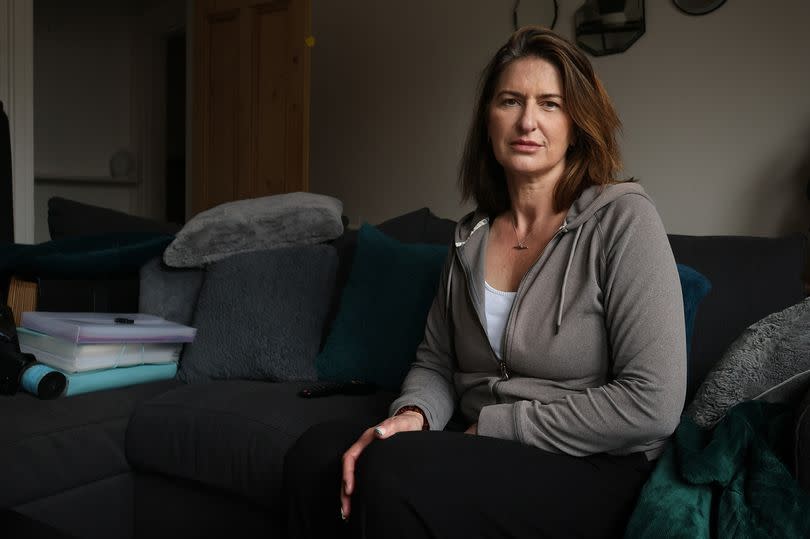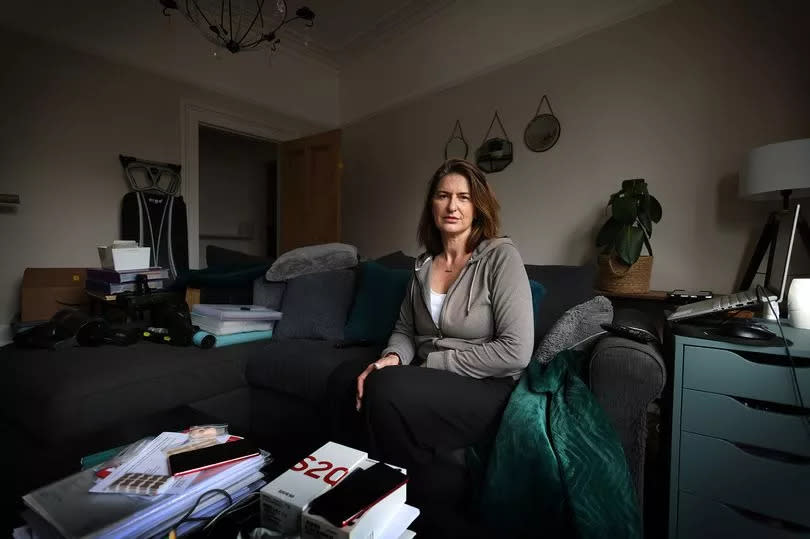‘I didn't expect my life to get like this': Living in Didsbury, suffering from cancer, waiting for the bailiffs to come

Living with cancer and days away from homelessness, Emma is trapped in a crisis. She moved to Manchester, looking for a new beginning near to where her long-distance partner was living.
Emma settled into a £1,300-a-month ground-floor apartment with her cats, Luna and Sunny, in one of the city’s most sought-after locations. Yet now she is counting down the days until bailiffs will arrive at her front door - and says the council has effectively told her to sit tight until they arrive.
“It’s all a bit like a Channel Five documentary,” Emma, 50, told the Manchester Evening News. “I didn’t expect my life to get like this.”
READ MORE: 'I could lose everything': The desperate woman turned away from HUNDREDS of houses
After working in finance for around a decade, in compliance and anti-money laundering departments at Canary Wharf, Emma had grown tired of life in the capital. She wanted to set up her own home organisation business and relocate to Cheltenham, Gloucestershire, where a friend was living.
Her plans were turned upside down in December 2019 when she was hit by a motorbike which jumped a traffic light, leaving her unable to work as she recovered from her injuries. Months later, the country was locked down. Emma spent much of the pandemic living with her mum.

She moved to another place in East Dulwich, south-east London, which turned out to be an illegal sublet - leaving Emma with an ongoing battle to recover her possessions after the locks were changed. Emma headed north to Manchester in November 2021, moving into the Didsbury flat she still calls home.
But her health soon began to deteriorate, the relationship ended three months after Emma moved to Manchester, and her plans to start a new career in the city crumbled. Emma was diagnosed with non-Hodgkin's lymphoma, a type of cancer, in early 2023.
She has also suffered with arthritis, two torn ligaments and an auto-immune issue for which she has been undergoing tests in hospital. And then, last May, her new beginning in Manchester suffered another blow.
'I don't know what's going to happen'
Emma was issued a Section 21 notice, meaning she faces what is commonly known as a ‘no-fault eviction’. It’s a situation which has seen her thrust into the sharp end of Manchester’s housing crisis.
“[The landlord] just came round and said that ‘we need the property back’,” said Emma. She insists her landlord ‘didn’t really explain anything or listen to what I had to say’.
The M.E.N. spoke to Emma's landlord, who said the decision to issue a Section 21 notice was a difficult one to make and one he had not taken before. The landlord stated it was issued due to personal reasons which he wished to remain private.
"It's very easy for it to look like the person that's prepared to serve the Section 21 is a bad person," the landlord said. "But I'm not prepared to reveal my personal issues to make it an even footing [with Emma's situation]."
Under Section 21, landlords are required to give two months’ notice for an eviction, but do not need to give a reason for it. Emma says she spoke to solicitors using legal aid who were able to postpone her eviction to a point, but she received an accelerated procedure notice before Christmas.

A court letter, seen by the M.E.N., informed Emma she will be evicted at midday on Thursday, May 9, when bailiffs are expected to arrive. Since February 12, most of Emma’s belongings have been kept in storage.
For the days left until bailiffs turn up, her rented Didsbury flat is still her place of security. Emma says she first contacted Manchester City Council about her situation when she was first issued the Section 21 notice, but she is still in the same position.
She says that she was told that, should she leave the Didsbury property before bailiffs arrive with no alternative accommodation in place, she would be considered voluntarily homeless by the council and ineligible for support. Emma said: “It looks like it might come to the day of [bailiffs]. I have to wait and see where I’m going, but it’s going to be tricky with two cats and me not driving.”
Finding somewhere else to live isn’t easy for most people in today’s Manchester, where soaring rents and overwhelming demand is the norm. And for a person in Emma’s position, it’s almost impossible. She currently stumps up the £1,300 monthly rent alone, and insists she has not missed a payment.
But as she is unable to work due to her health, she has been reliant on support from her sister, an insurance pay-out after being run over in 2019, and on benefits. “I moved up here for a new start,” said Emma. “But it didn’t work out.”

Emma has been searching the private rental market for somewhere new to live. She has struggled to find somewhere she can afford - and she says letting agents have not even allowed her to view certain properties because of her circumstances.
Emma has been told she needs an annual salary of 30 times the monthly advertised rent of properties she is interested in applying for - effectively pricing her out of Manchester’s private rental market. She has had to join Manchester's waiting list for social housing, but her circumstances are not deemed an urgent priority for the local authority.
Emma said: “Every time I ask what’s happening [the council] says I’m not high on the list because I’m not fleeing domestic abuse, even though I have no one to support me up here.”
The M.E.N. put Emma's claims to the town hall, which stated it has to 'prioritise the most urgent cases', but insisted it was doing all it can to support her. In the meantime, Emma faces a cliff-edge, with her destiny out of her own hands.
“I don’t know what’s going to happen,” she said. “I can’t find anywhere that I can afford. There aren’t enough places.”
The battle over 'no-fault evictions'
Last month, MPs voted on legislation which includes plans to ban Section 21 no-fault evictions, following a manifesto commitment from the Conservative government. Housing Secretary Michael Gove previously told the BBC he wants the Renters (Reform) Bill to become law before the next general election, and it is now due to face further scrutiny in the House of Lords.
But campaigners, who had initially backed the Bill, have withdrawn their support amid a row over when the ban could be enforced. MPs voted by 287 to 144 in favour of a new clause, which means the Government will assess the effects of the new law on the county courts system, before the Section 21 ban is rolled out.
Speaking to the Commons on April 24, housing minister Jacob Young said the Government could not provide a date when no-fault evictions would be abolished 'until we're confident that the county court system is ready'. He added: "We’re investing £1.2 million for the courts and tribunals service to deliver these new processes.
“If we don’t have a ready court system when we make this change, the biggest change in 30 years, if the courts aren’t ready for these changes that will not benefit tenants, it won’t benefit landlords, but it certainly won’t benefit tenants either.”
Meanwhile, Conservative MP Natalie Elphicke said the Bill in its current form was a 'betrayal' of her party's manifesto commitment - saying the clause in question 'could indefinitely delay the abolition of Section 21 no-fault evictions'. And Labour's shadow housing minister Matthew Pennycook stated the Bill is 'not yet fit for purpose', claiming the Government wanted to 'further tilt the playing field to the landlord interest'.

Charities are also concerned. Shelter chief executive Polly Neate accused the Government of committing 'a colossal act of cowardice in the Commons by ratifying an indefinite delay to the ban'. While Tom Darling, campaign manager of the Renters Reform Coalition, added that the Bill 'needs major surgery' before becoming law.
Official figures released this week stated that a record 25,910 households were threatened with homelessness across England due to Section 21 in 2023. Commenting on the figures, the Joseph Rowntree Foundation tweeted that 'homelessness will continue to rise unless the Government strengthens the Renters (Reform) Bill to protect renters'.
The Government insists the ban remains its focus, however. A Department for Levelling Up, Housing and Communities spokesperson said: "Our commitment to scrap Section 21 no-fault evictions as soon as possible is unchanged.
"We have always said we will give six months notice before ending Section 21 for all new tenancies. In addition, we have committed to ensuring improvements in the courts service are rapidly implemented before extending this abolition to all existing tenancies.”
Chris Norris, policy director at the National Residential Landlords' Association (NRLA), told the M.E.N. earlier this year that while he does not oppose the ban on Section 21 evictions in principle, he stated that the measure can sometimes be used by landlords with legitimate reasons for eviction.
He explained this is because it is quicker than the court process for tenants acting unlawfully - although this doesn't apply in Emma's situation, with the landlord's action being taken for his own personal reasons.
Mr Norris added that he doesn't 'expect a lot of sympathy for landlords' - but the problems they face have wider ramifications for the rental market.
Tax changes and surging mortgages have left many landlords out of pocket. And when landlord costs' rise, or if they quit the market, tenants' costs also rise as competition grows for rented properties.
The position facing the town hall
Emma is now on Manchester's waiting list for social housing, which stands at 17,000. The town hall has previously stated that 36,000 new homes must be built across the city over the next decade to keep up with demand, of which 10,000 must be affordable.
The council has ambitions to build 500 homes a year through a development company and sell off land to housing associations, but the lack of currently available social housing in the city is at the heart of Emma's situation, and won't be easily fixed.
Meanwhile, Emma's claim that she has been advised to sit tight for bailiffs to arrive or risk becoming intentionally homeless is also part of a wider pattern.
During the Renters (Reform) Bill debate, housing minister Jacob Young criticised ‘some’ local authorities who he said were ‘encouraging tenants on a blanket basis to remain in a property until the bailiffs are at the door’. “That is wrong,” he said.
“Doing so creates further delays in possession, penalises landlords who have a legal right to their property, and can be stressful and - in the long run - not beneficial at all to the tenant. The guidance is clear on the importance of early prevention. Authorities should contact landlords at an early stage to understand the circumstances of an eviction, and establish what steps can be taken to prevent homelessness.”
It's a situation that has also been criticised by the NRLA, which says that councils telling tenants to wait for the bailiffs to arrive 'should no longer be common'. A blog post on its website says: "Both the Homelessness code of practice and the Homelessness Reduction Act 2017 mean that most local authorities should take a Section 21 notice as the trigger to support tenants with a homelessness action plan.
"This action plan involves working with the tenant to ensure they have accommodation and contacting the existing landlord to see whether the tenancy can be sustained. If not, then the local authority should work with the tenant to find suitable accommodation for them, either in the PRS or in social housing."
Last week, the M.E.N. spoke to 57-year-old Moira, another Manchester resident who had been issued a Section 21 notice. Like Emma, Moira said she had been told by the council to 'stay in here until the bailiffs come'.
The M.E.N. asked Manchester City Council to comment on Emma's situation, including her position of waiting for bailiffs to arrive. It's understood the council's position is for tenants in Emma's position to stay at the property as long as possible, while housing officers try to help them find private rented accommodation.
A Manchester City Council spokesperson added: "We understand that this is a difficult situation for Emma. Our housing prevention service has been working with her since she received the Section 21 notice from her landlord, and because the threat of eviction is imminent our private rented sector team are looking for a property which will be offered to her before she needs to leave her current accommodation.
"Due to the length of the social housing waiting list we have to prioritise the most urgent cases and that while we sympathise with Emma's position she does not fall into that category, but we are doing all we can to help her until such point as social housing becomes available."

 Yahoo News
Yahoo News 
